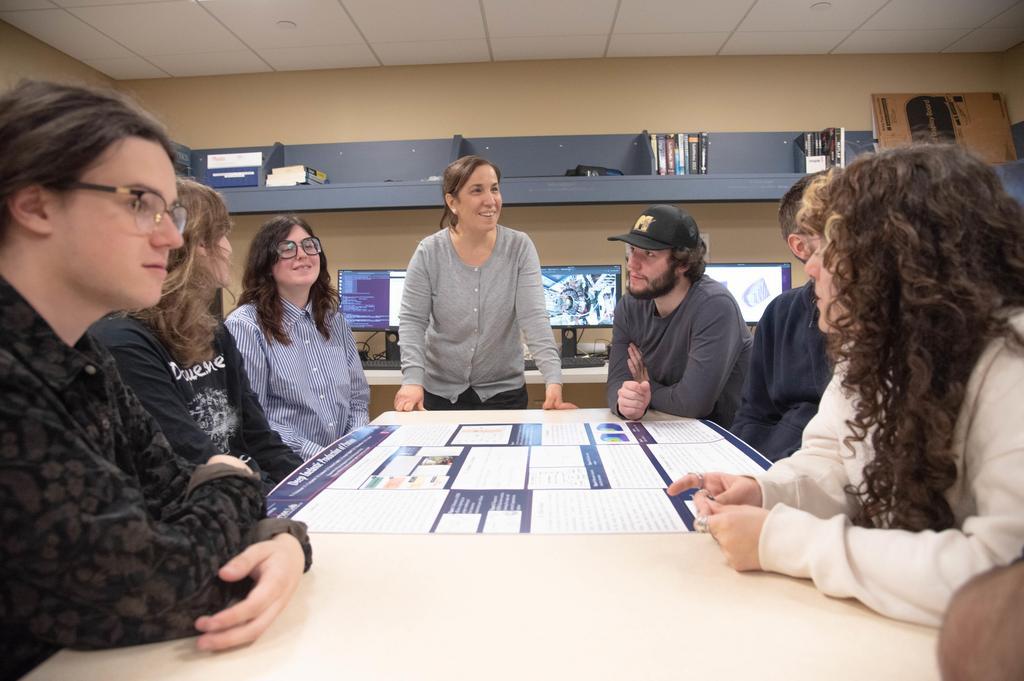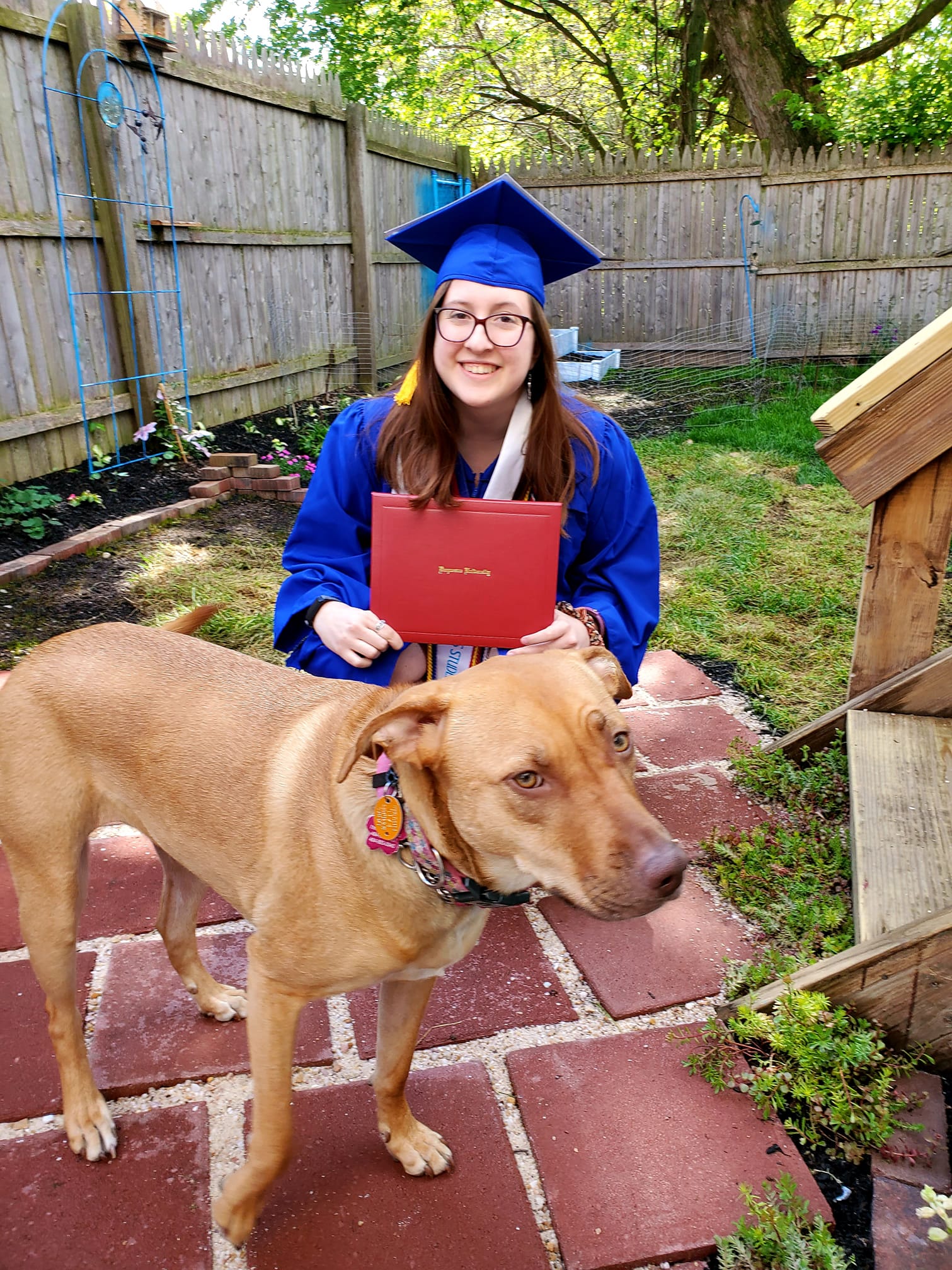BA Physics
We get it: you love physics, but your calling is to be a teacher, or a physician or an engineer—careers that have so many undergraduate requirements. Could you still make it work? You can with the bachelor of arts degree.
The bachelor of arts in physics combines the basic physics foundation with the flexibility to choose advanced coursework that appeals to you. All this while keeping the required physics credits at a manageable total without compromising expectations of breadth and rigor. While fewer physics credits are needed to graduate, bachelor of arts candidates are subject to the same expectations of skills as bachelor of science candidates and take all their physics courses together.
Your coursework will include lecture courses in the active learning style where, in addition to your noggin, you will apply the mathematics and computing training that you receive in the co-requisite requirements. It also includes a sequence of five physics lab courses encompassing electronics, optics, programming, measurement best practices and data analysis. Your capstone project will give you the chance to show off your hard-earned skills!
If you are headed for medical school
This degree is ideal for pre-meds who like physics and are not afraid of math! Did you know that pre-meds who major in physics outperform most MCAT takers on average? All chemistry, biology and behavioral sciences fit into our BA program.
If you are planning to be a high school physics teacher
How much physics do you really need to know to be able to teach in high school? More than two semesters, but surely not as much as a research physicist. A happy medium is ideal to make you an inspiring physics teacher.All education requirements fit into our BA program, even the field experiences!
If you are planning to be an engineer
What is the difference between a physicist and an engineer? They both have similar skills, but are trained to approach the same problems with different mindsets, particularly protocol and risk tolerance.If you are always wanting to know the “why” of everything, a physics degree will be the right add-on to your engineering career, making you more marketable. We make this easy with our 3+2 physics/engineering program.
Program Information
The Bachelor of Arts in Physics gives you a solid physics foundation and versatility to accommodate other interests such as pre-med prerequisites, a second major in engineering, or science teacher preparation requirements.
Program Type
Major
Degree
Bachelor's
Academic Department
Physics
Duration
4-year
Required Credit Hours
120
Hear From An Alum
Prepared For Anything
Hear From A Student
Join our vibrant community of passionate learners, dedicated faculty, and accomplished
alumni who have excelled in various physics-related domains. Unleash your potential,
develop a deep appreciation for the wonders of physics, and embark on a rewarding
journey that will shape your future.
After Duquesne
A major in physics opens the door to a multitude of careers, including employment in industry, technology, and finance, and serves as the prerequisite degree for medical, dental and law school.
Typical Course Sequence
The physics courses beyond Year 1 can be completed in two years. Research is not required, but ample opportunities are available.
- PHYS 221 + 221L Physics I - Mechanics + lab (5 cr)
- EQ XXX Essential Questions Seminar (3 cr)
- MATH 115 Calculus I (4 cr)
- BRDG 101 Writing and Analysis (3 cr)
- BRDG 100 Research & Info Skills (1 cr)
Spring Semester (17 credits)
- PHYS 222 + 222L Physics II - Electromagnetism + lab (5 cr)
- CHEM 121 + 121L Chemistry I+ lab (may take in Fall) (5 cr)
- COSC 150/160/170 Programming (3 cr)
- MATH 116 Calculus II (4 cr)
- PHYS 302 Optics (3 cr)
- PHYS 312 Optics Lab (1 cr)
- MATH 310 Linear Algebra (3 cr)
- MATH 215 Calculus III (4 cr)
- BRDG 105 Intro to Ethical Reasoning (3 cr)
Spring Semester (15 credits)
- Experiential Learning (PHYS 340 UG research recommended) (1 cr)
- MATH 314 Differential Equations (3 cr)
- PHYS 374 Modern Physics (3 cr)
- CHEM 122 + 122L Chemistry II + lab (3 cr)
- General Elective (3 cr)
- Physics Elective (4 cr)
- Physics Elective (3 cr)
- Bridges course - Cultural Fluency (3 cr)
- Bridges course - Social & Historical Reasoning (3 cr)
- MATH 301 Prob & Stats or General Elective (3 cr)
Spring Semester (13 credits)
- PHYS 105 Career Seminar (1 cr)
- PHYS ____ Physics Elective (3 cr)
- General Elective (3 cr)
- BRDG 102 Writing and Literature (3 cr)
- General Elective or MATH 308 Numerical Analysis (3 cr)
- Physics Elective (3 cr)
- Bridges course - Ethical Reasoning (3 cr)
- ENGL 302W Scientific Writing (3 cr)
- General Elective (3 cr)
- General Elective (Theology/Philosophy as needed) (3 cr)
Spring Semester (14 credits)
- PHYS 464 Advanced Lab (capstone) (2 cr)
- Physics Elective (3 cr)
- General Elective (3 cr)
- General Elective (3 cr)
- Bridges course - Critical Thinking (3 cr)
- PHYS 332 Electronics (3 cr)
- PHYS 350 Math Methods in Physics (3 cr)
- PHYS 401 Thermal Physics (4 cr)
- PHYS 404 Solid State Physics (3 cr)
- PHYS 405 Gravitational Astrophysics (3 cr)
- PHYS 461 Mechanics (4 cr)
- PHYS 470 Electricity and Magnetism (3 cr)
- PHYS 473 Electrodynamics (3 cr)
- PHYS 474 Quantum Mechanics (3 cr)
- PHYS 475 Advanced Quantum Mechanics (3 cr)
- PHYS 482W Particle Physics (3 cr)
- PHYS 485 Relativity (3 cr)
- PHYS 491 Introductory Materials Science I (3 cr)
- PHYS 502 Adv Optical Theory and Devices (3 cr)
-
PHYS 499W Senior Research (2 cr)





